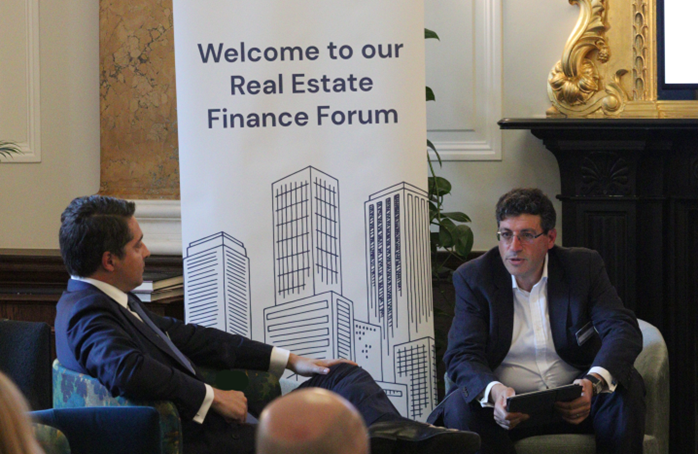-
At a recent CREFC Europe event co-hosted by LaSalle and property developer Regal London, representatives from the real estate industry’s leading debt funds, banks, and developers came together to discuss the outlook for European real estate credit markets.
Hosted at LaSalle’s new London offices, the open-forum discussion between all participants covered topics such as the (re)financing environment for borrowers and lenders, where lenders and borrowers see best value and greatest opportunity, and who should assume the responsibility for bearing the costs of delivering sustainable real estate.
A higher interest-rate environment, quick on the heels of the pandemic, makes this an important juncture for participants in this diverse and opaque market to share perspectives. Introducing the session, Dominic Silman, LaSalle’s European Head of Debt and Value-Add Capital Research and Strategy, compared analysing real estate debt markets to the parable of the blind men and the elephant. Each interprets what they can feel, depending on the part of the elephant that they are holding – from snake to tree to fan. Likewise, real estate debt markets are covered by a variety of different data sets which, taken in isolation, can fail to capture the bigger picture.

Last month, CREFC Europe launched their inaugural Real Estate Finance Forum with LaSalle and Regal London Some of the megatrends remain readily apparent. The migration of commercial real estate lending activity away from banks and towards debt funds has been a dominant theme over the past 15 years. The long-running Bayes Business School study of UK CRE lending found that, in the first half of last year, debt funds exceeded domestic banks’ new originations for the first time. Funds will continue to play an increasing role in addressing the financing gap created by banks’ ongoing retrenchment and the considerable quantities of debt falling due for refinancing in the next 15 months.
However, it can be a challenging market for funds to negotiate those refinancings. David White, Managing Director in LaSalle’s Debt Investments team, pointed out that over the past 18 months, certain asset valuations have rebased – but it’s not always clear to what level.

David Dahan, Industry Initiatives Director at CREFC Europe, and David White, Head of LaSalle Real Estate Debt Strategies discuss asset valuations. Close collaboration between borrowers and lenders is becoming more critical than ever before in order to unlock the right structured financing solutions in the face of forthcoming debt maturities. Lenders need to work closely with sponsors to understand how business plans are evolving in light of the macroeconomic environment.
A lot of what is seen in the market today is focused on sectors with especially strong occupier fundamentals, and their ability both to capture rental growth in line with inflation and to access relatively liquid capital markets. Logistics, residential, student and select operational sectors, such as hospitality, are widely considered to offer resilient fundamentals. Marc Eden, Investment Director at Regal London, spoke of their decision to diversify across the beds sectors, from residential to student with hotels and later living in the mix too. Continuing the earlier theme, Richard Craddock, Managing Director in LaSalle’s Debt Investments team, explained that “elephants are going to the same few watering holes – beds, sheds and, selectively, ‘meds’”.
This is resulting in a reasonable degree of liquidity for originating new financings in those preferred sectors. In that context, a lender’s geographic scope and ability to deploy across borders offers flexibility to be more selective. Debt funds may also benefit from access to differentiated pockets of debt capital, from senior lending to mezzanine debt to development / refurbishment financing. Borrower demand for bespoke financing solutions makes this an attractive environment in which to be active and to deploy a broad range of capital across diverse market opportunities.
Outside of those preferred sectors, the consensus view seemed to be that the traditional sectors of offices and retail were most challenged, particularly for offices outside of Prime CBD where valuations were deemed not to have yet caught up with the cloud of uncertainty surrounding future occupier demand. A few participants with significant exposure to the office sector acknowledged that much of their time was consumed with managing their book. A key takeaway from this part of the conversation was that, regardless of sector, modern real estate is more operational, and lenders look beyond the assets themselves through to the sponsors. As with the period post-GFC, the market will see a flight to quality of assets and sponsors.
The discussion closed with a debate on the willingness of lenders – and their underlying investors – to encourage borrowers to invest in environmental upgrades by offering economic incentives.

Various ideas were discussed during an open floor conversation. The valuation premium for assets with top-performing ESG credentials, particularly in the office sector, is widely understood. Lenders can therefore frame this question from a risk-adjusted return perspective: a greener building makes for better-quality collateral and therefore reduced risk. A similar logic applies at the owner/occupier level. Jonathan Seal, CEO of Regal London explained that in his discussions with potential office occupiers, wellness, energy efficiency and the associated sustainability accreditations were incredibly important to draw people back to the workplace.

An industry-wide discussion on the outlook for European real estate credit markets. However, because of the opaque relationship between a building’s sustainability performance, the costs of refurbishment and the impact on cashflows and valuation, this requires a deep understanding by all parties of real estate fundamentals, asset carbon / ESG performance and how to underwrite specific assets and their associated business plans.
The conversation on ESG highlighted two key inter-linked challenges: metrics and data. There was consensus among participants – borrowers and lenders alike – that assets with better ESG credentials intuitively offer better risk profiles. However, due to the embryonic nature of some metrics and an inconsistency in others as well as lack of transparency in data, especially for social and governance considerations, there was no common language to help differentiate risk and respective margins. This made it difficult to agree on who should provide the financial incentives for the transition of assets.
Overall, the conversation underlined one of the key characteristics of lending markets today. Real estate credit is currently a highly attractive asset class – but it’s only those lenders able to underwrite individual asset-level fundamentals in terms of quality, location and ESG specifications who are best placed to capitalise.

Jul 23, 2024
ISA Focus: Investing in real estate debt
LaSalle’s Research and Strategy team examines the place for private real estate credit in institutional portfolios.





